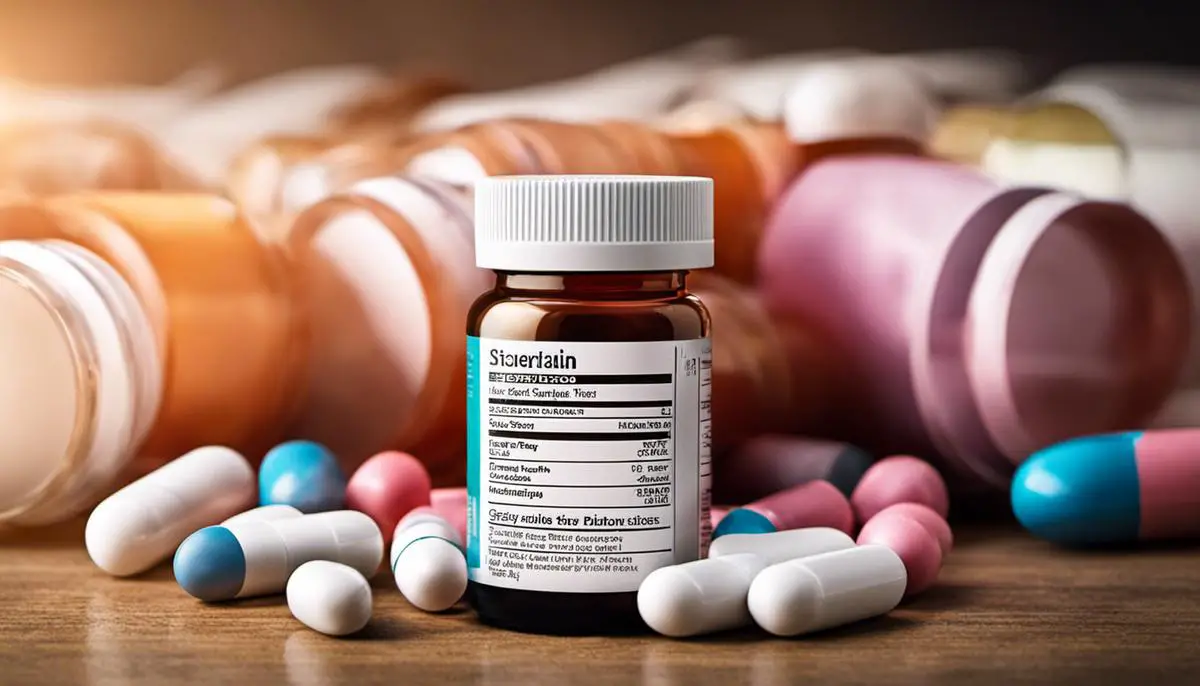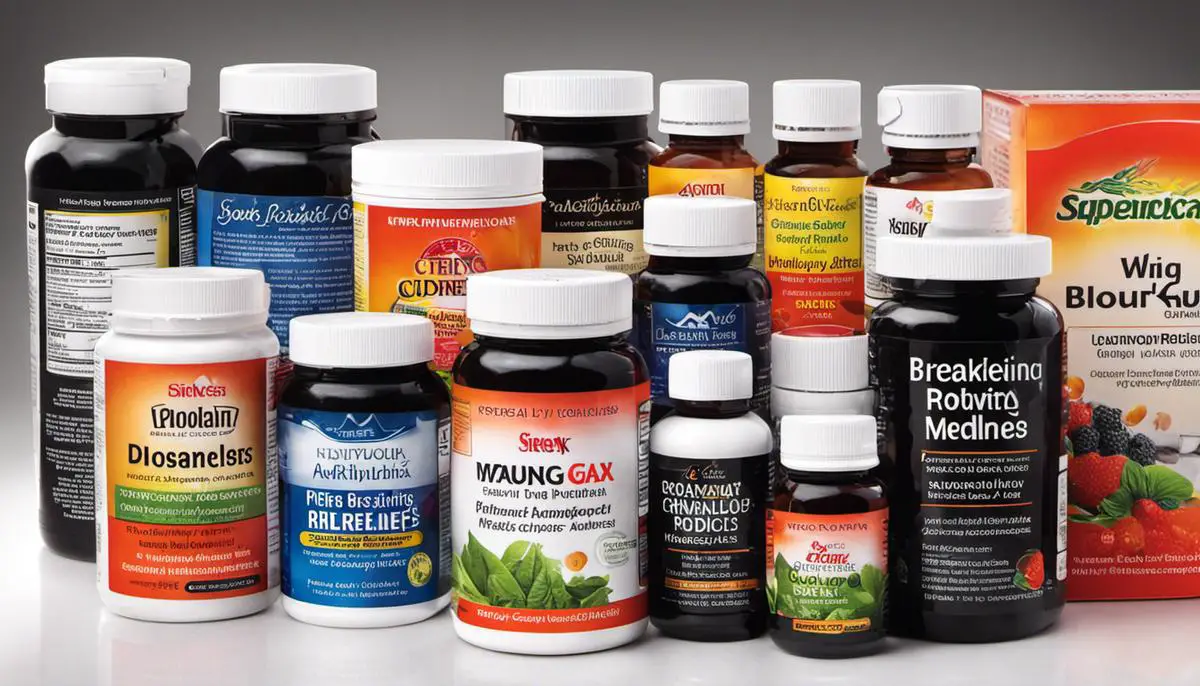Bloating, while common, can be a disruptive and uncomfortable phenomenon affecting many people today. A combination of dietary habits, lifestyle factors, and certain health conditions can significantly contribute to bloating, impacting our digestion processes and overall body functioning. The ability to grasp the underlying causes of bloating paves the way for effective relief and management. In our journey to comprehending this issue, it’s essential to explore the over-the-counter medications, prescription medicines, natural remedies, and lifestyle adaptions available to alleviate the bloating symptoms. This exploration empowers individuals with the knowledge to choose the most suitable bloating relief medicine based on personal health status, severity, and causes of bloating, ensuring a healthier, more comfortable living.
Understanding Bloating
Understanding Bloating
Bloating is a state of excessive fullness or swelling in the abdomen that can occur due to gas buildup in the digestive tract. It often leads to discomfort, a sensation of fullness, and sometimes, pain. This condition can be temporary, caused by eating or drinking too quickly, consuming certain types of food and beverages, or swallowing air, or it can be skillfully linked to digestive disorders or illnesses such as irritable bowel syndrome (IBS), liver disease, and heart failure.
Common Causes of Bloating
Factors relating to food and lifestyle play a key role in bloating. Certain foods known to produce digestive gases include legumes, lentils, broccoli, cabbage, onions, and carbonated drinks. Consuming such food in large quantities can lead to bloating. Overeating is also a known cause, as it can make you feel stuffed. Additionally, eating too quickly can cause you to swallow air, which gets trapped in your digestive system causing bloating. Lifestyle habits like smoking, not getting enough physical exercise, and stress can contribute to bloating too.
Health conditions can be significant contributors to bloating. For instance, disorders such as gastroesophageal reflux disease (GERD), gastric ulcers, pancreatitis, gallstones, celiac disease, and gastrointestinal blockages can all cause bloating. Hormonal changes in women during menstrual periods can also lead to temporary bloating. Furthermore, bloating can be a symptom of serious conditions like ovarian cancer and liver disease.
Bloating and Digestive Functioning
The build-up of gas due to bloating can interfere with the normal functioning of the digestive system. It can slow down the digestion process as the system becomes overloaded with gas, leading to discomfort and even pain. In extreme cases, bloating can even change the shape and functioning of the digestive tract. These alterations in digestive health can impact the body’s ability to absorb nutrients effectively, which in turn potentially affects general health and wellbeing.
Understanding Bloating Relief Medication
Bloating relief medications primarily work by either decomposing gas bubbles or facilitating the transit of gas through the digestive system. Antacids, lactase supplements, Beano, and Simethicone are all examples of over-the-counter (OTC) remedies that can help alleviate symptoms. Other natural remedies such as Activated Charcoal and Peppermint Oil capsules are also utilized for gas and bloating relief. In more severe instances, related to conditions like IBS or GERD, the use of prescription medications may be necessary.
Probiotics, beneficial in promoting a balanced gut bacteria, can also play a significant role in controlling and providing relief for bloating. They can be consumed as dietary supplements or found naturally in certain foods like yogurt. Moreover, there are non-medicinal approaches to relieving bloating, including abdominal massages, specific exercises, and dietary modifications aimed at limiting the ingestion of gas-inducing foods. Always remember to consult with a healthcare provider for personalized advice on managing bloating, as triggers and bodily responses can differ vastly between individuals.

Over-The-Counter Medications for Bloating
A Closer Look at Over-The-Counter Bloating Relief Medications
A variety of over-the-counter (OTC) medicines to ease bloating are readily available on the market. The way these medicines work is dependent on their specific active components. Some of these medicines provide assistance with the digestive process, while others aim to decrease gas production or enhance gut motility, providing further relief from bloating.
Common Active Ingredients in OTC Bloating Relief Medicine
The common active ingredients in OTC bloating relief include Simethicone, Loperamide, and Probiotics.
Simethicone
Simethicone is an anti-foaming agent that works by lowering the surface tension of gas bubbles, which facilitates the passing of gas and reduces gas build-up. Simethicone is usually taken after meals and at bedtime. The typical adult dose is 40-125 mg, four times daily.
Loperamide
Loperamide is an anti-diarrheal medication that slows down the movement of the gut. This reduces the speed at which the intestines are working, helping prevent bloating and discomfort. The recommended adult dosage for Loperamide is 2 mg after the initial loose stool, followed by 2 mg after each subsequent loose stool, not to exceed 16 mg (or 8 capsules) in any 24-hour period.
Probiotics
Probiotics are beneficial bacteria that are essential in digestion. Taking probiotics can help to restore the natural balance of bacteria in the gut, alleviating symptoms such as bloating and gas. There is no one-size-fits-all dosage for probiotics as it depends on the specific strain and the individual’s needs. However, a common dosage range for adults is between 5 billion to 10 billion colony-forming units (CFUs) per day.
Side Effects And Effectiveness Of Bloating Relief Medicines
Like all medicines, OTC bloating relief medications can have side effects. Simethicone can cause heartburn, belching, and diarrhea. Loperamide might lead to dizziness, constipation, and stomach pain. While probiotics are generally safe, they can result in an upset stomach, diarrhea, gas, and bloating in some people.
It’s important to note that everyone’s body reacts differently to medications, so the effectiveness of these OTC bloating relief medicines can vary. For some, Simethicone may provide prompt relief while, for others, Loperamide or a probiotic supplement may prove to be more effective.
Over-the-Counter Bloating Relief Medicine: Accessible and Effective
Convenient bloating relief can be found in various over-the-counter (OTC) medicine brands. Simethicone is a popular active ingredient and is offered under brands like Gas-X, Mylicon, and Phazyme. Another frequently used ingredient is Loperamide, most commonly available under the brand name Imodium. Probiotics, known for their digestive health benefits, are also widely used for bloating and sold under numerous brands including Culturelle, Align, and Florastor.
These OTC remedies for bloating provide ready access to relief. However, they also come with varied effects and potential side effects. As such, it is crucial to always consult healthcare professionals before starting any new medication regimen.

Natural Remedies and Lifestyle Changes
Nature’s Pharmacy: Herbs and Spices for Bloating Relief
In looking beyond the medicine cabinet, numerous herbs and spices have been noted for their anti-bloating properties. For instance, ginger’s anti-inflammatory attributes play a role in easing gastrointestinal discomfort and relieving bloating. Research has pointed out that ginger helps to alleviate symptoms of functional dyspepsia, which includes bloating, by improving gastric emptying and antral contractions. Similarly, peppermint oil also possesses historical usage for mitigating symptoms of irritable bowel syndrome, such as bloating and abdominal pain. As substantiated by a meta-analysis of nine different studies, peppermint oil is significantly more effective than a placebo in managing IBS symptoms.
Exercises: Love for your Gut
Exercises, particularly yoga poses dedicated to digestive health such as Pawanmuktasana (Wind Relieving Pose) and Ardha Matsyendrasana (Half Lord of the Fishes Pose), can help reduce bloating by promoting bowel movement and releasing trapped gases in the digestive tract. Moreover, regular aerobic exercise, such as walking and swimming, can stimulate the muscles in the gut and aid digestion, diminishing the incidence of bloating.
Dietary Changes: A direct Impact on your Digestive System
Reducing intake of gas-producing foods, like broccoli, cabbage, onions, beans, apples, and carbonated drinks, can significantly alleviate bloating. Incorporating food rich in fiber can also prove beneficial but should be done gradually since sudden high intake of fiber can make bloating worse. Drinking plenty of water supports regular bowel movements and helps prevent constipation, a common cause of bloating. Furthermore, probiotic supplementation has shown promising results in managing bloating and abdominal distension. It’s crucial to understand that tolerance to certain types of food and probiotic strains varies from individual to individual.
Steps for Implementation and Research
Starting with small changes like adding anti-bloating herbs to your meals, increasing daily physical activity, and gradually incorporating fiber-rich foods into your regimen can make a significant difference over time. Regular monitoring of your body’s response to these changes can give important cues on what works best for you.
There are several remedies that may provide relief from bloating, based on findings from smaller studies and anecdotal evidence. These have not all been studied thoroughly in extensive clinical trials, therefore the specific mechanisms of action, appropriate dosages, and possible interactions are not yet fully understood. It is recommended to consult with your healthcare provider before trying out any new remedies for bloating.

Prescription Medications for Bloating
Understanding Prescription Medications for Bloating
If you’re dealing with severe or persistent bloating, know that there are several prescription medications that could provide relief. These include Proton Pump Inhibitors (PPIs), H2-Receptor Antagonists, Simethicone, and in some cases, antibiotics. The choice of medication largely depends on the root cause of the bloating. Consulting with a medical professional will ensure the most effective treatment plan for your condition.
Proton Pump Inhibitors (PPIs)
PPIs, including drugs like omeprazole (Prilosec), lansoprazole (Prevacid), and esomeprazole (Nexium), work by reducing the amount of acid produced in the stomach. They are often used for patients who experience bloating associated with acid reflux or peptic ulcers. The decreased acid levels can relieve bloating symptoms caused by these conditions.
The common side effects of PPIs can include headache, nausea, diarrhea, abdominal pain, fatigue, and dizziness. Long-term use can lead to vitamin B12 deficiency, low magnesium levels, and may increase the risk of bone fractures.
H2-Receptor Antagonists
Another class of drugs, H2-receptor antagonists, also reduce the amount of acid produced by the stomach. Drugs within this category, including ranitidine (Zantac) and famotidine (Pepcid), may be employed if PPIs are not effective or suitable.
Side effects of H2-receptor antagonists can include headache, vomiting, diarrhea, constipation, and fatigue. Rarely, long-term usage might lead to vitamin B12 deficiency.
Simethicone
Simethicone is a drug used to alleviate bloating and gas buildup in the stomach and intestines, allowing gas bubbles in the stomach and intestines to come together more easily, which can then be passed more easily.
Side effects are uncommon but might involve stomach upset and diarrhea. It’s recommended to seek immediate medical help for serious allergic reactions, though these are rare.
Antibiotics
In some cases, antibiotics may be prescribed to treat bloating if it is caused by a bacterial overgrowth in the small intestine, a condition known as SIBO (Small Intestine Bacterial Overgrowth). It is important to note antibiotics are not a common treatment for bloating, and their usage requires precise medical diagnosis.
Just like individual experiences of bloating, the effectiveness of bloating relief medications also varies greatly. While some receive instant respite from uncomfortable bloating, others may have to experiment a bit and try different medicines before they find the one that works for them. Your healthcare provider can guide and support you through this process so remember to communicate with them before starting any new medication.

How to Choose the Right Bloating Relief Medicine
Diving Deeper into Bloating Relief Medicines
Bloating relief medicines aid in reducing the unease and pressure in your stomach, which can occur due to overindulgence, swallowing air, consuming food and drinks that produce gas, or due to certain health conditions. You’ll find a variety of these available in drugstores including antacids, probiotics, Gas-X, and activated charcoal — each catering to different specific needs.
Choosing the Right Medicine Based on Individual Needs
Selecting the right bloating relief medicine requires understanding your individual needs and the severity of your symptoms. Over-the-counter (OTC) options like antacids and gas relief drugs may be sufficient if you occasionally experience bloating. However, for regular or severe bloating, a medical professional may recommend stronger prescription medication or probiotics.
Choosing Based on the Causes of Bloating
The underlying cause of your bloating can also significantly affect the appropriateness of different types of medicine. For instance, if you often experience bloating after consuming dairy, you may be lactose intolerant, and using lactase supplements might help. On the other hand, if you are bloated due to irritable bowel syndrome (IBS), a dietary supplement like peppermint oil might be beneficial as it relaxes the muscles of your intestines, reducing bloating.
Choosing with your Health Status in Mind
Your overall health status may also dictate what type of bloating relief medicine you should use. If you have any chronic health conditions, certain medicines may not be recommended. For instance, if you regularly take blood thinners, some OTC antacids might not be safe for you. Similarly, people with kidney diseases need to be cautious with certain types of antacids and any supplement should not be taken without consulting a healthcare professional.
Importance of Professional Advice
Regardless of the type of bloating relief medicine you think might be best for you, always consult with a healthcare professional before starting a new medication. Remember, over-the-counter does not mean without potential side effects. These professionals can help you make an informed decision based on your symptoms, overall health, and potentially undiagnosed conditions. They can also guide you towards a medication that is proven, safe, and effective in treating bloating.
An open dialogue with your healthcare provider can help implement lifestyle measures along with choosing the right bloating relief medicine. This helps in increasing the medicine’s effectiveness, improving overall health, and potentially uncovering any undiagnosed health conditions that may be causing your bloating.
Role of Dietary and Lifestyle Changes
While this guide focuses on choosing the right bloating relief medicine, it’s crucial to remember that medication is only one part of managing bloating. Dietary changes, including reducing the intake of gas-producing foods and beverages, and regular physical activity can often significantly reduce bloating symptoms and, in some cases, may even eliminate them completely. These lifestyle modifications should be discussed as part of your comprehensive bloating management plan with your healthcare provider.

It is important to keep in mind that everyone’s body is unique, and what works for one person may not work for another. However, through understanding the diverse spectrum of options, from over-the-counter and prescription medications to natural remedies and lifestyle alterations, we are better equipped to navigate the wide array of bloating relief solutions. The choice of the most effective bloating relief medicine is dictated greatly by the individual’s needs, the severity of symptoms, and the root cause of bloating. Finally, remember the value of professional healthcare advice in helping to tailor a personalized approach to bloating management. Empowered with this knowledge, you are now in a position to enhance your overall well-being and live a more comfortable and health-centric life free from the distress brought about by bloating.
